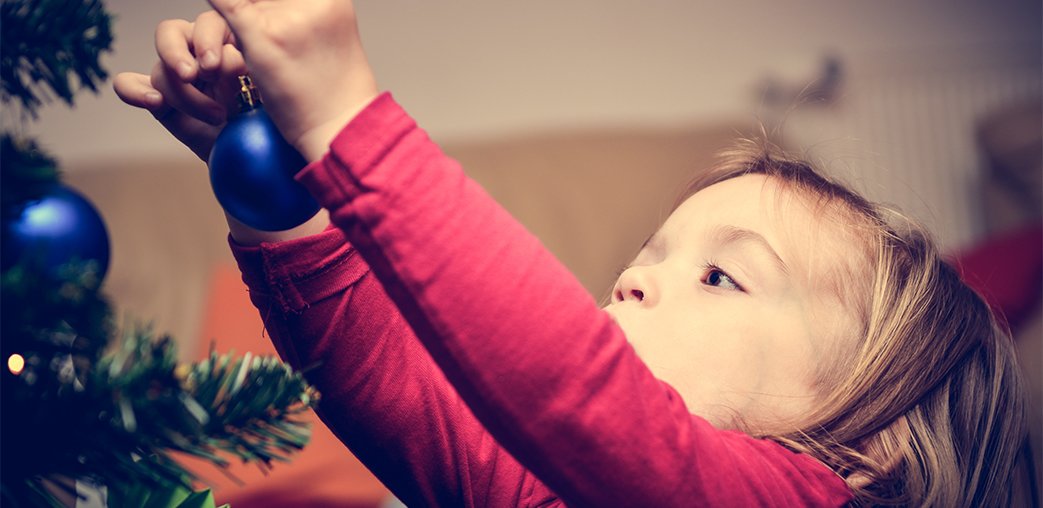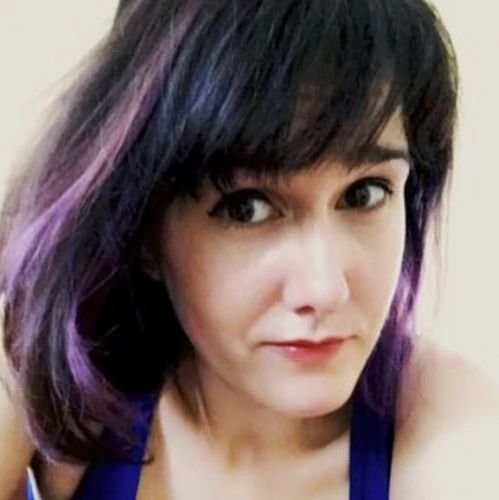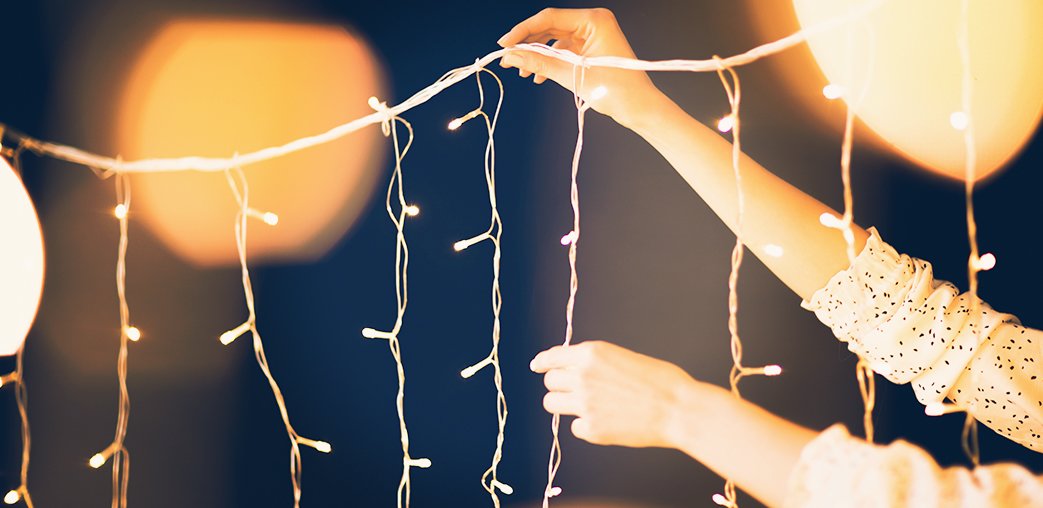Christmas is Complicated for an Agnostic Parent Raising Jewish Children

Approximately six months into my relationship with my college boyfriend, we were sitting at a Pizza Hut when he nervously told me, “When I have kids, I want to raise them Jewish.”
I shrugged. “That’s fine with me.”
And that’s how a lapsed Episcopalian turned lazy secular humanist made a commitment to a non-practicing Jew that their hypothetical offspring would be Jewish.
That was 20 years ago. We’ve been married for 12 years, and our children are 9 and 7 years old. Every December they light eight candles and get eight days of presents. We sing songs in Hebrew that I sing as fluently as my husband. It’s second nature by now, and I enjoy it.
But a tiny part of me, my inner child, misses Christmas. As much as I appreciate my mother’s attempts to blend some of our traditions into a form compatible with Hanukkah (“Hey kids, let’s make gingerbread Maccabees!”), it’s just not quite the same.
As a child, I would wake up while the streetlights were still on and crawl into my sister’s bed so we could rifle through our stockings together. When it was time to open presents, we would sit in front of a crackling fire in the living room fireplace and listen to Handel’s “Messiah” — a work that is famously controversial over potential themes of anti-Semitism. Definitely not something I would be able to work into my family’s adapted holiday celebrations.
After we were done with our gifts, we would wander downstairs to my grandmother’s apartment and do the whole thing again under a different tree, then head to my other grandmother’s house to celebrate again with my father’s extended family. My children don’t have grandparents nearby, much less in the same house like I did. I feel that lack of family proximity, both on the Christian and Jewish sides, most fervently at the holidays.
I existed in a middle-realm between Christianity and Judaism, while believing in the cosmology of neither.
Christmas as a child was a family-filled exuberant ritual, but I was never good at Christmas as an adult. We lived in New York City for years before the kids were born, and I was too lazy and broke to buy a tree from a corner bodega and drag it up five flights of stairs to our 400-square-foot apartment. I had my childhood ornaments, though, so one year I tied them to a white floor fan and arranged presents underneath it. The stockings were hung from the fire escape window bars with care. My husband thought I had lost my mind, but I was just being practical.
After that, though, my attempts at observing Christmas dwindled in an equivalent ratio to my attempts to keep kosher for Passover. Pesach is also eight days but is much less fun than Hanukkah, and for my husband’s sake I agreed to join him in abstaining from bread. In December, my parents still sent me presents and cookies; in the spring, during Pesach, I would inevitably break on day five and scarf down an entire Papa John’s pizza. I existed in a middle-realm between Christianity and Judaism, while believing in the cosmology of neither.
I chose not to convert to Judaism when my husband and I got married. I am not an atheist, but I am also not a Jew; I am not a Christian either. I couldn’t in good conscience take a vow to join a religion to merely adopt the cultural values and not the spiritual beliefs.
In both Reform and Conservative forms of Judaism, children are considered Jewish in interfaith marriages as long as they are raised Jewish. What exactly “raised Jewish” means is somewhat ill-defined, however. About one in every five people in America were raised in an interfaith setting, but it’s difficult for me to consider our household truly interfaith.
Hanukkah is the one time of year that my children really feel Jewish, and I occasionally worry that feeling is built around the sensation that other kids get something they don’t.
I’m an agnostic, which means I assume there’s probably something going on beyond our comprehension that explains the universe but that it’s essentially pointless to worry about it. This leads to a lot of situations where my kids ask deep, theological questions and my only option is to say, “I don’t really know; go ask your father.”
But even there, my husband embraces Jewish religious views when queried, but his main commitment to Judaism is to his cultural and historical background. We don’t take them to temple. We don’t observe the Sabbath. Both children are autistic, so the possibility that they will be able to go through the process of being bar or bat mitzvah is only about 50/50, even if we did belong to a congregation.
The prayers they know are the ones we say at the Passover seder we attend each year and the songs we sing in front of the menorah — or, more specifically, the hanukiah. Hanukkah is the one time of year that my children really feel Jewish, and I occasionally worry that feeling is built around the sensation that other kids get something they don’t.
They do, however, get eight nights of presents and songs, eight nights when we’re together every night as a foursome at sundown, and eight nights of whatever gingerbread Maccabees my mother sends via UPS from Florida. Having that unity as a family was the original goal my husband and I had in making the religious and cultural choices we did.
So, I don’t get to relive my childhood every December, but we’ve made a whole new set of traditions. It would be even better if I could get my kids to eat latkes, but I’ll work with what I have.

Maggie BenZvi is a contributing editor for Coffee or Die. She holds a bachelor’s degree in political science from the University of Chicago and a master’s degree in human rights from Columbia University, and has worked for the ACLU as well as the International Rescue Committee. She has also completed a summer journalism program at Northwestern University’s Medill School of Journalism. In addition to her work at Coffee or Die, she’s a stay-at-home mom and, notably, does not drink coffee. Got a tip? Get in touch!
BRCC and Bad Moon Print Press team up for an exclusive, limited-edition T-shirt design!
BRCC partners with Team Room Design for an exclusive T-shirt release!
Thirty Seconds Out has partnered with BRCC for an exclusive shirt design invoking the God of Winter.
Lucas O'Hara of Grizzly Forge has teamed up with BRCC for a badass, exclusive Shirt Club T-shirt design featuring his most popular knife and tiomahawk.
Coffee or Die sits down with one of the graphic designers behind Black Rifle Coffee's signature look and vibe.
Biden will award the Medal of Honor to a Vietnam War Army helicopter pilot who risked his life to save a reconnaissance team from almost certain death.
Ever wonder how much Jack Mandaville would f*ck sh*t up if he went back in time? The American Revolution didn't even see him coming.
A nearly 200-year-old West Point time capsule that at first appeared to yield little more than dust contains hidden treasure, the US Military Academy said.













